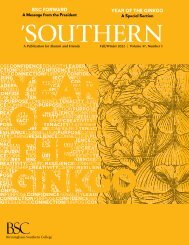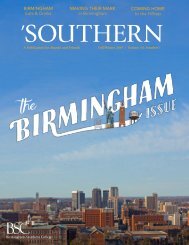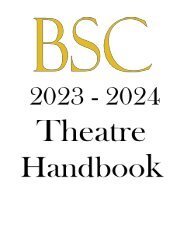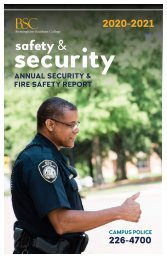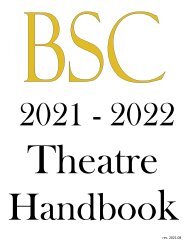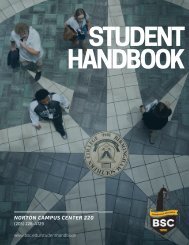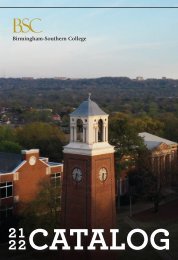2019-2020 BSC Catalog
Create successful ePaper yourself
Turn your PDF publications into a flip-book with our unique Google optimized e-Paper software.
ACADEMIC PROGRAMS<br />
87<br />
HS 203<br />
HS 242<br />
HS 499<br />
PY 101<br />
PY 224<br />
three units from the following, with at least one unit in biology or chemistry, at least<br />
one unit in psychology or sociology, and at least two units at the 300 or 400 level:<br />
BI 304<br />
BI 308 or CH 308<br />
BI 402<br />
BI 405<br />
CH 211<br />
CH 220<br />
CH 418<br />
CH 428<br />
HS 200<br />
PY 217<br />
PY 312<br />
PY 313<br />
PY 314<br />
SO 370<br />
one rise 3 course or project that allows students to connect a relevant experience<br />
with their academic content knowledge, self-knowledge, and/or public values and<br />
interests<br />
CH 418, CH 428, and SO 370 have prerequisites not included in major requirements.<br />
History<br />
Bachelor of Arts<br />
William Hustwit, Randall David Law, V. Markham Lester, Matthew Levey,<br />
Victoria Ott, Mark S. Schantz<br />
The history faculty engages students in an inquiry into the past. By reconstructing earlier<br />
civilizations and perceiving various ages within a time frame stretching from prehistory<br />
to the present, the history student comes to see an age in relationship to what came before<br />
and what follows. A sense of continuity is developed that expands mental horizons,<br />
permits fruitful comparisons to be made with the present, and allows a more acute<br />
awareness of one’s surroundings. The effort to understand the peoples of the past makes<br />
use of various skills and techniques including the evaluation of evidence, employment of<br />
imagination, research skills in diverse sources of information, and effective oral and<br />
written communication skills. A primary concern of the study of history is change. The<br />
student who is conscious of the continuous process of change is better prepared for the<br />
conditions of change taking place today.<br />
The concentration in public history prepares students for careers and advanced degrees in<br />
public history, an exciting and challenging field that has experienced strong growth in<br />
recent decades. Public historians practice history outside of the academic classroom by<br />
serving as mediators of historical knowledge in partnership with the public and<br />
community institutions through preserving and interpreting historical records and using<br />
them to contextualize important issues for today’s public. This can be done through many<br />
venues and media, including museums, libraries, living history sites, documentary film,<br />
historic preservation, historical societies, government service, and physical and digital<br />
Birmingham-Southern College <strong>Catalog</strong> <strong>2019</strong>-<strong>2020</strong>




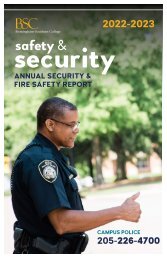
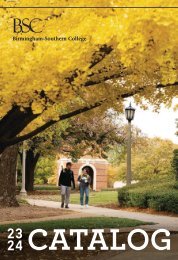
![2023-2024 BSC Catalog Updated_UG ONLY_FINAL[82]](https://img.yumpu.com/68414854/1/178x260/2023-2024-bsc-catalog-updated-ug-only-final82.jpg?quality=85)
